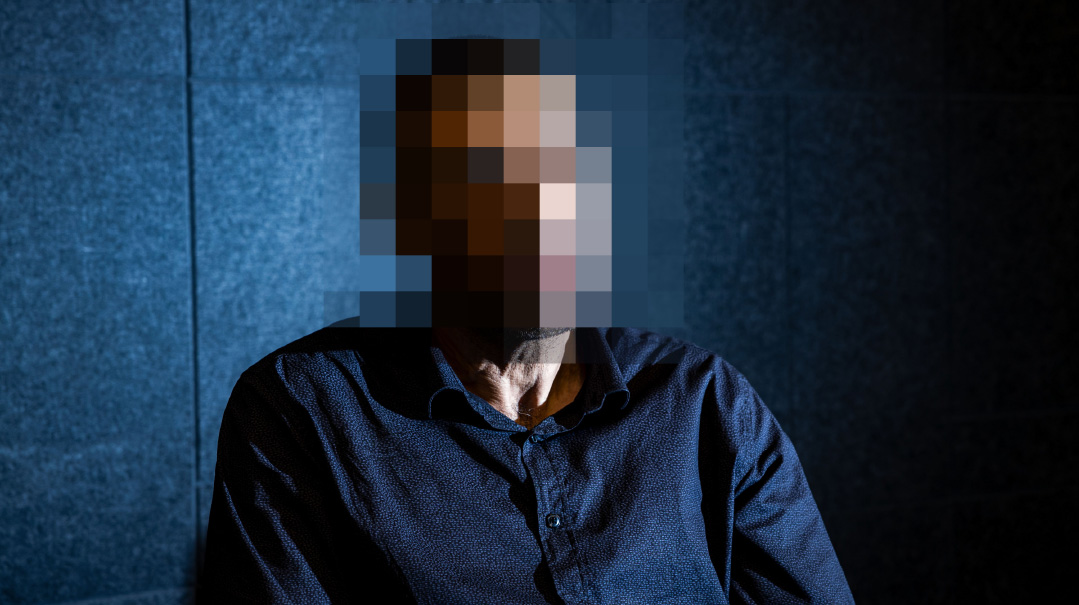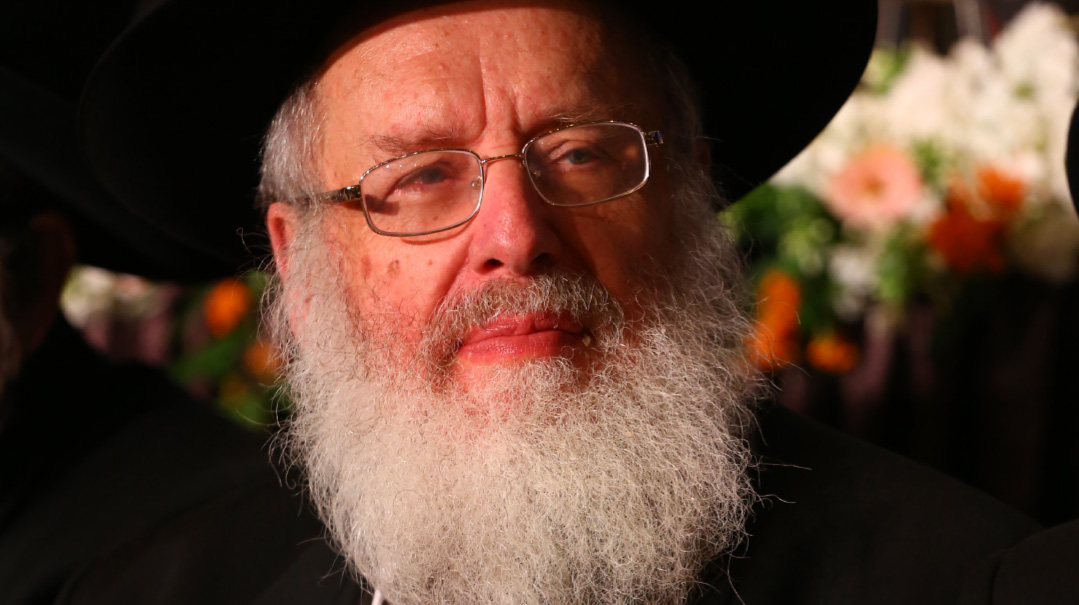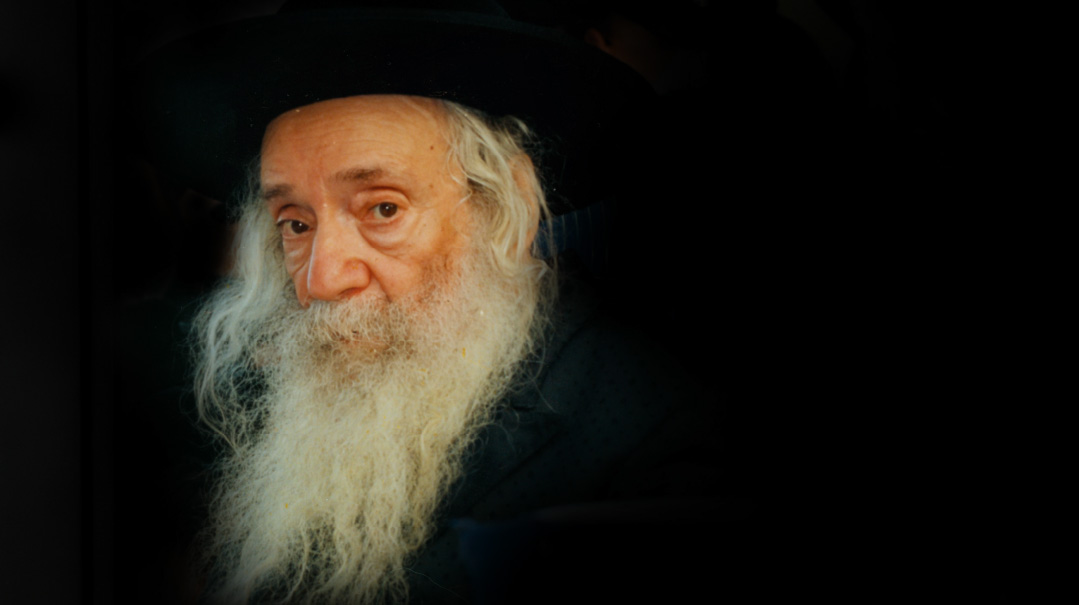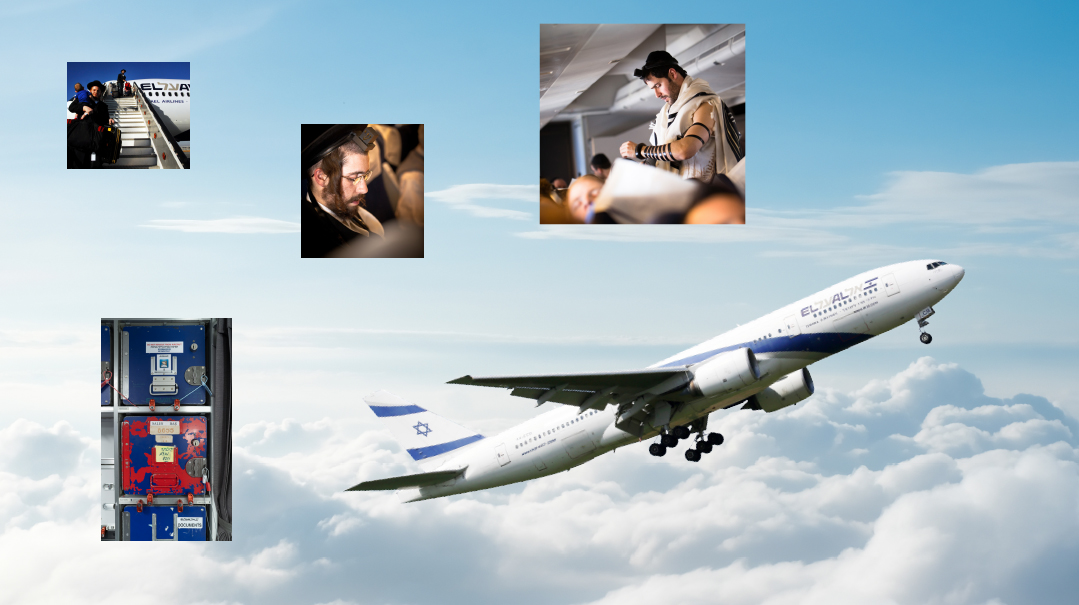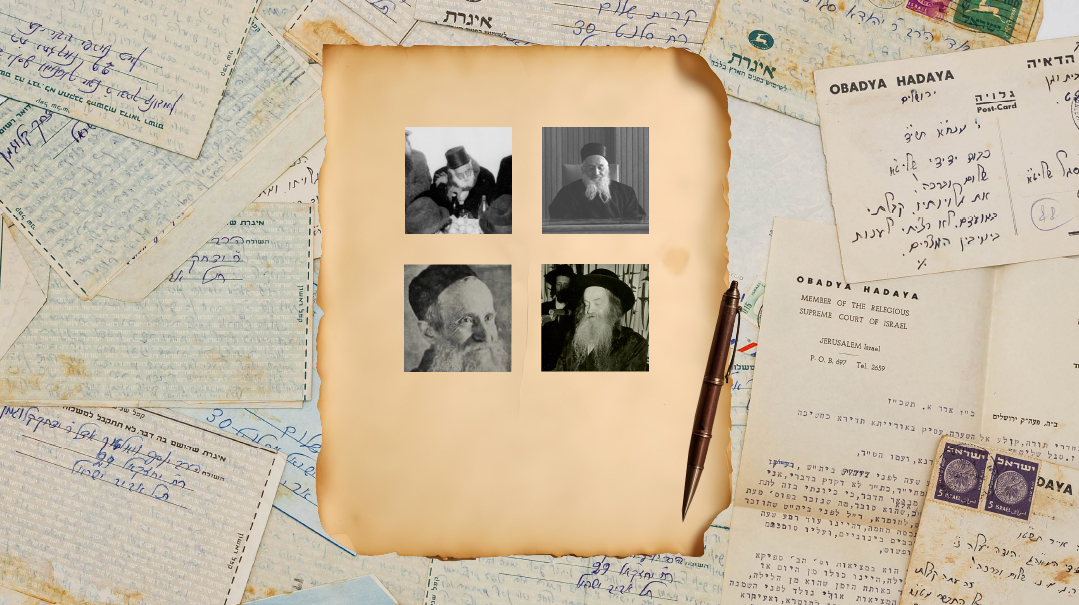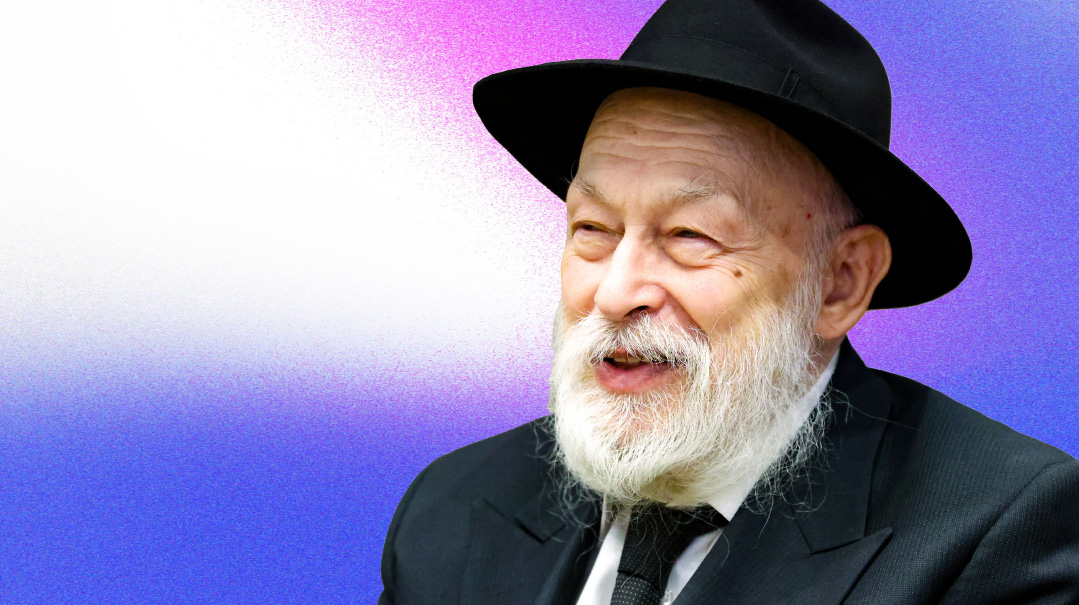Class Act

Rabbi Armo Kuessous is the first stop and last word in chinuch today
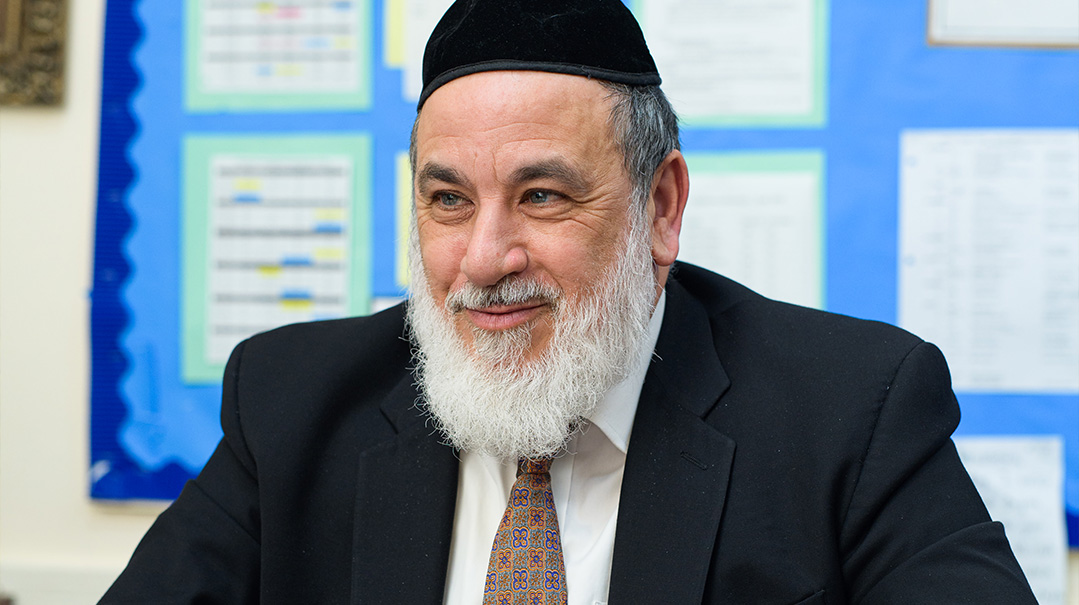
Photos: Naftoli Goldgrab, Family archives
When parents bring their four- and five-year-old sons to Yeshivat Shaare Torah in Brooklyn for their Pre-1A interview, they aren’t directed to an office to wait. Instead, the principal, Rabbi Armo (Amram) Kuessous, meets them right at the door. “Wow!” he exclaims. “This must be the famous Yaakov/Avi/Ezra!”
It’s a typical encounter for Rabbi Kuessous (pronounced “Kesoos”), whose gift for putting the boys and their parents immediately at ease, together with his natural warmth and intuition, sets the tone for the entire school. He also brings those special talents of innovation, creativity and heart to Mesivta Torah Temimah, where he serves as the general studies principal. Rabbi Kuessous is a top name in chinuch today with an unusual crossover appeal as an administrator in both Sephardi and Ashkenazi yeshivos. Master mechanech that he is, Rabbi Kuessous is additionally famed for his summer job as head counselor of Camp Romimu, where over 600 boys receive an injection of Torah ruach and fun that buoys them with inspiration long after their mothers have washed the last suitcase of dirty laundry.
Rabbi Kuessous’ signature blend of authority and warmth is really the continuation of a family legacy. His parents were newcomers to North America, yet their instinctive understanding that a yeshivah chinuch was the best — and only — guarantee of their children’s future eventually made the family name synonymous with chinuch excellence a generation later.
Esther Kuessous, Reb Armo’s wife, remembers her mother-in-law as a warm and devout woman, completely devoted to her family, and constantly engaged in conversations with Hashem. Her father-in-law was hardworking, charming, and a model of integrity. “The Kuessous children grew up on a shoestring, but they were always proud and content,” Esther says.
Eliyahu and Luna Kuessous left Morocco in 1957 to settle in Toronto. Their sons Moshe and Jack had already been born, and Mrs. Kuessous gave birth to her daughter Merchie (today Merchie Herskovits) a month after her arrival. Armo, originally given the French name Armand (English speakers heard it as Armo, and Armo it remained) would also be born in Toronto, the youngest of the family, with a 12-year gap between him and his oldest brother Moshe a”h — who would become a venerated mechanech and Reb Armo’s own role model.
Reb Armo’s grandparents in Morocco were pious, sincere Yidden — his paternal grandfather had a long white beard — but his parents’ generation had already become more Europeanized. “It’s because we didn’t have enough Jewish schools in Morocco that we lost some of our Yiddishkeit,” Rabbi Kuessous says, yet they retained a sense of emunah peshutah and veneration of rabbanim. Rabbi Kuessous’s father was still growing in his Yiddishkeit at the point when he was looking to get married, and when he met the daughter of a distinguished Torah family, he knew she was the one he wanted to marry.
While Rabbi Kuessous’ maternal grandfather was a talmid chacham and yirei Shamayim, he allowed his daughter to marry the handsome, successful businessman from Tangiers. No one would have predicted that beneath the dashing exterior lay an as-yet untapped bren for Torah that would one day transform him into an icon of Toronto’s frum community.
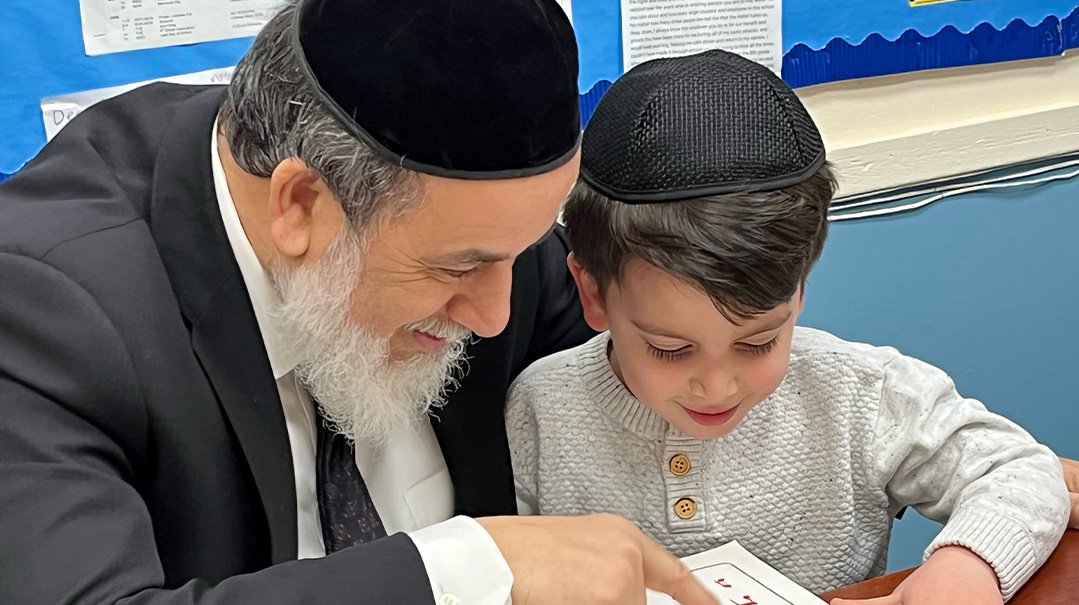
Whether it’s Sephardi Shaare Torah, Mesivta Torah Temimah or Camp Romimu, when it comes to Torah learning and inspiration, Rabbi Kuessous is an equal-opportunity mechanech
When the Kuessous family arrived in Toronto in 1957, there wasn’t much of a frum infrastructure. But Mr. Kuessous was determined to enroll his children in Jewish schools, and in the absence of Sephardic yeshivos, sent them to Yeshivas Eitz Chaim.
There were only a few Sephardi boys in the school, and the Kuessous children endured a certain amount of suspicion and teasing. But it didn’t stop young Armo, a gregarious mover and shaker from an early age, from making plenty of friends and being elected as the school’s student council president.
Their father was working in construction when, in 1970, he was literally felled by a work mishap: His back was badly injured, to the point where he couldn’t continue in his job. How would he support his family?
The previous year, Rabbi Shlomo Miller had opened a kollel in their neighborhood, and he hired Mr. Kuessous to be the shamash and manager of the kollel. “But he was really much more than that,” Rabbi Kuessous relates. “The kollel recently celebrated their 50-year anniversary, and they acknowledged my father for being one of the pillars of the kollel.”
This seeming “outsider” from a different background and culture instinctively understood what the Torah community needed and became a foundation of its growth.
Rav Shlomo Miller had a deep influence on the Kuessous family. Through his guidance, the eldest son Moshe enrolled at the Telshe Yeshiva in Cleveland, while his brother Jack was sent to yeshivah in Denver. The Torah learning and levels they achieved impacted the entire family.
“My brothers would come home from yeshivah for Yom Tov and gently point out to my parents areas of halachah that they were unaware of,” Rabbi Kuessous remembers. “But my parents never objected. In fact, they were always mekabel whatever they were taught with grace and humility — it was a complete naaseh v’nishma.”
His father had a deep sense of integrity. “He always had a twinkle in his eye and was extremely humble, but with strength of character,” Esther Kuessous remembers.
“People knew you didn’t mess with ‘Mr. K.,’” says Rabbi Kuessous. “My father would always keep a watchful eye at the kollel to make sure that all who entered treated this makom Torah with respect. He was influential in the chinuch of the children of the avreichim in the kollel, many of whom have gone on to become tremendous bnei Torah.”
When Armo was 15, his parents sent him to learn in yeshivah in Scranton, Pennsylvania. Rav Yaakov Schnaidman imbued the yeshivah with his presence and Torah scholarship, and Armo developed such a strong connection that he stayed on for the next 12 years. (Moving so far from home was considerably assuaged by the fact that his sister Merchie, now married, was then living in Scranton; she returned to Toronto in 1980 and has served ever since as the director of the Bais Yaakov preschool.) Armo remained in Scranton for high school and beis medrash, eventually serving as a dorm counselor and rebbi there while continuing his learning. His years as a dorm counselor shaped his future in chinuch as well, as he kept a watchful eye on all the boys there, and often consulted with the Rosh Yeshivah on issues that arose with bochurim who needed an extra bit of understanding and guidance. Some of those bochurim are rabbanim and roshei yeshivah today, with whom he still maintains close relationships.
Rabbi Kuessous recalls an encounter that greatly impacted his own sense of chashivus haTorah and instilled added pride in his father’s humility and dedication to the Toronto kollel. When he was a bochur in Scranton, he and some friends decided to go to Lakewood for an off Shabbos. His friends’ fathers were all Lakewood talmidim and instructed their sons to visit Rav Shneur Kotler ztz”l, who was then very ill. Armo’s friends entered the Rosh Yeshivah’s room to give a shalom aleichem and offer good wishes from their fathers, while he himself waited patiently for them in the back of the room. At one point Rav Shneur, sitting in his chair, frail and weak, lifted his eyes and noticed the young boy in the back of the room and inquired who he was. When Rav Shneur heard the name “Kuessous,” his voice noticeably lifted, and with a big smile on his face, he asked, “From Toronto?” He told the bochurim in the room, “This boy’s father always reminded me of the shamash of the Chofetz Chaim, who would clean the floors of the beis medrash with his long beard!”
In 1983, Reb Armo took off a year from Scranton to learn in Montreal under Rav Mottel Weinberg ztz”l. “The yeshivah was about to close, and sent out a call for bochurim to come learn there during the Elul zeman,” Rabbi Kuessous relates. “Six yeshivos were supposed to send bochurim, and I came with one other bochur, but that was it — no one else showed up. I called the yeshivah in Scranton to see what to do, and in the end, my friend and I stayed even past Elul — and it turned out to be an incredible year of learning for me. I learned with Rav Mottel in the mornings and Rav Shlomo Avigdor Altusky, his son-in-law and the rosh yeshivah of Darchei Torah, for second seder. Rav Shmuel Yellin, today a tremendous talmid chacham living in Lakewood, was the other bochur I came with, and whom I learned with at night. I have eternal hakaras hatov to all of them, and to my yeshivah in Scranton.”
After moving to Brooklyn to serve as a rebbi at the Yeshiva of Kings Bay, he met his wife, Esther, a longtime teacher and administrator who shares his passion for chinuch and has touched the lives of myriad students and teachers with intuition and sensitivity.
Like his parents before him, Rabbi Kuessous was always looking for ways to be better and do better. As a lifelong learner who’s always reading and availing himself of training opportunities, he enrolled in a master’s program at Adelphi University in special education and reading instruction; he would later study to become a certified life coach which, given his natural touch for counseling people, may have just been a case of gilding the lily.
While educated in Ashkenazic yeshivos, it was only a matter of time before Rabbi Kuessous would bring his talents back to the Sephardic community. His brother Rabbi Moshe Kuessous a”h — leader of a nascent kollel in Deal, New Jersey and highly-respected avreich — was teaching at Yeshivat Shaare Torah in Brooklyn, and subsequently became the menahel of the Boys’ Elementary School, under the venerable leadership of Rabbi Hillel Haber, who — realizing the need for a separate boys’ yeshivah in the community — founded the yeshivah in 1982 with nine students.
In 1994, Reb Armo made the decision to join his brother’s yeshivah, and began his career in Shaare Torah as a fourth-grade rebbi. “Rabbi Haber runs the yeshivah with a pure and honest touch that filters down to the entire staff and reaches every talmid,” he says. “The rebbeim are talented and extraordinarily dedicated bnei Torah, and have a special relationship with their talmidim. We have a ‘no child left behind’ policy, which means we customize our chinuch and address the needs of the whole child.”
After working as a rebbi for five years, Reb Armo grew so deeply involved he soon became the assistant principal. When his brother Reb Moshe became ill, Reb Armo began filling in for him, and after his petirah in March of 2011, Reb Armo was asked by Rabbi Haber to step into his brother’s position.
Rabbi Keussous also works in the afternoons as the principal of General Studies at Mesivta Torah Temimah. It’s not an easy job, because it means keeping restless students engaged in limudei chol after hours of limudei kodesh. Yet Rosh Mesivta Rabbi Chanoch Posey says Rabbi Kuessous is a master at engaging the students and keeping wild behaviors from escalating. “He often uses stories — sometimes about his own high school experiences — and, with his finger on the pulse of today’s teenagers, always seems to know when a student needs some time out. He’ll tell him, ‘You need a little time in the gym.’”
“I have the utmost respect for the children growing up in today’s generation,” Rabbi Kuessous says. “Their relationship with Hashem is real. They seek to understand and to grow, in spite of the fact that they’re growing up in a completely different world from the one I grew up in. The values of secular society have reached an all-time low, and the exposure to the nuances of their ideologies that are so contrary to Torah values is much more prevalent and confusing.”
Rabbi Kuessous believes in working with the boys at a deep level while they’re still young, in order to resolve the issues that might hinder their success as adults. He remembers how years back, a boy at Shaare Torah was bullied; his self-esteem was destroyed. This boy wasn’t a strong student either and needed psychological building up as well as academic support. This fellow recently met Rabbi Kuessous — today he’s married, a father, learns in kollel, and is considering a career in chinuch. “He turned out great,” Rabbi Kuessous says, ”and I think he’ll make a very sensitive rebbi.”
Another boy began his own turnaround after his class watched the Chofetz Chaim Foundation film The Bystander, about bullying. “I’m the guy in that movie — I’m a bully!” the boy told Rabbi Kuessous later in his office, the tears coming freely. Rabbi Kuessous recalls that this boy was bright, strong and athletic, but felt insecure because he was short. “You have to get to the root of the problem, pinpoint the issue and say it straight to the person,” Rabbi Kuessous says. “This boy didn’t change overnight, but we worked with him, and he transformed.”
What makes a Sephardi yeshivah different from an Ashkenazic one? Obviously, the Hebrew pronunciation is different, as are the minhagim and the hazzanut, of which the Sephardim are very proud. “There is a sense of pride and deep respect for the rich heritage felt throughout the Sephardic community, and it permeates throughout the yeshivot,’’ Rabbi Kuessous says.
But when it comes to Torah learning, Rabbi Kuessous is an equal- opportunity mechanech. He introduced the popular gedolim cards, and the boys enjoy collecting and learning about gedolim from all backgrounds. “One of my young students became enamored of Rav Shmuel Kamenetsky and put together an entire album with pictures of the Rosh Yeshivah, and then persuaded his parents to set up a meeting and drive him to Philadelphia. When they arrived, Rav Shmuel’s gabbai told the family that they had five minutes to enjoy the company of the Rosh Yeshivah, but when Rav Shmuel saw the excitement of the young boy, he welcomed them warmly, made sure to be duly impressed with the boy’s photo album, and told him, ‘For you, I have two hours.’”
While the Ashkenazic community of Brooklyn is experiencing a population decline, as young couples (often followed by their parents) seek more affordable, expansive pastures like Lakewood, Monsey, and the Five Towns, the Sephardim aren’t leaving so fast.
“The Ashkenazic yeshivos are shrinking, while ours are growing,” Rabbi Kuessous says. “But not only that — they’re also veering more to the right.” And, like his own family who bowed their heads to daas Torah, “This community puts great faith in their rabbanim and mechanchim. They take their Yahadut and run all the way with it.”
Shaare Torah’s population is mostly of Syrian origin, with a parent body that has grown in observance over the past few decades. Many are successful businesspeople of substantial means. How does a Torah institution deal with the challenges of gashmiut in a community that has seen some great material success?
“In yeshivah, we simply don’t talk about it,” Rabbi Kuessous says. “The focus is on chinuch and genuine growth in all areas of yirat Shamayim. In fact, four years ago we changed our bar mitzvah policy to implement morning bar mitzvahs. If a family wants an evening affair, there are guidelines. People have been good about honoring the rules.”
Rabbi Kuessous looks for warm, positive people for his staff, people who are caring, organized, and responsible in their personal as well as professional lives. “We want people who are engaging, but have the ability to control a class,” he says. “Otherwise, you simply set them up for failure. Once we find the qualities we’re looking for, we can build rebbeim for life.”
“He spends hours coaching rebbeim, and not just those of Shaare Torah,” his wife says. Six of his former rebbeim have since left to become principals of other schools.
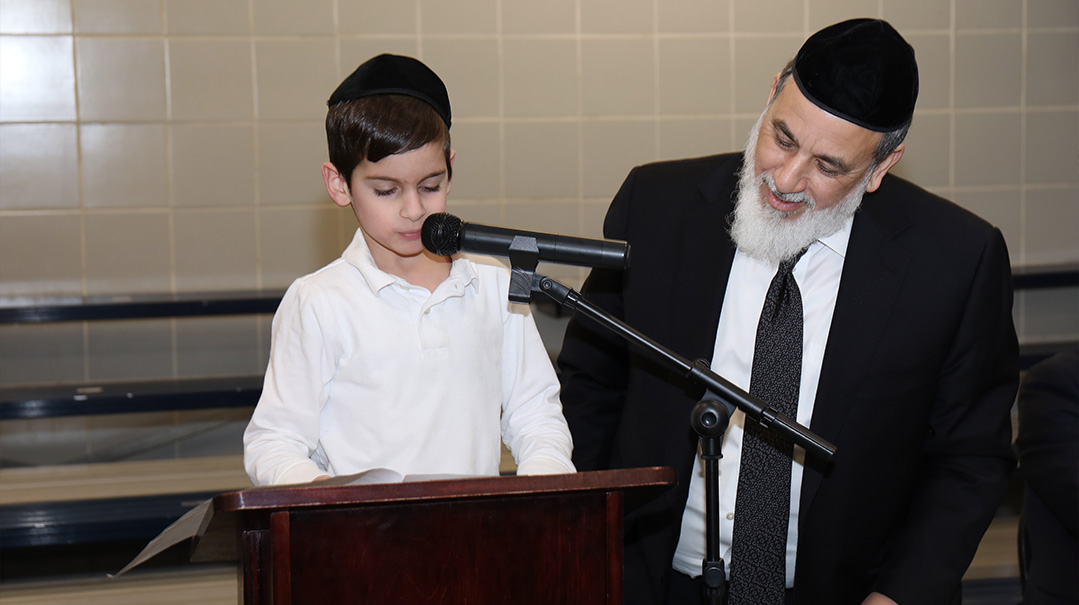
Rabbi Kuessous is the kind of person who, without fanfare, can juggle lots of balls in the air at the same time. But it’s not just a matter of efficiency; he infuses every enterprise with verve, fun, and an innate intuitive sense for human relationships. Best known in Brooklyn as a yeshivah principal, he has an even wider following among campers and staff at Camp Romimu in Monticello, where he has served as head counselor for the past 34 years, overseeing eight divisions, over 600 campers, and close to 150 staff members.
As a boy and young adult, Rabbi Kuessous went to Camp Agudah of Toronto as a camper and counselor. But in 1991, camp director Rabbi Shlomo Pfeiffer signed him up to be the head counselor at Romimu. It was the third year the camp was in existence, and he’s still there, bringing the same ruach to the job after over three decades.
During Romimu’s first year, there were only about 100 campers. Today, it’s one of the largest frum camps around, with divisions for all ages and a special-needs division as well. “It’s a beautiful facility. A lot of money is invested in the ruchnius to make it a real chinuch experience,” Rabbi Kuessous says. “We hear from the parents after camp that their kids come home transformed. But to accomplish that, you need to have a vision and an outstanding staff who share your vision and are not afraid to work hard.”
“Armo’s the emcee — he sets the tone,” says Rabbi Pfeiffer. “He commands respect and attention, keeping it fun without hefkerus. He also makes sure to keep an eye out for the underdog campers, the kids who are homesick or not thriving. For many kids camp is an opportunity to recharge and reset, and he gets that too.”
And just like children can blossom in camp, so, it seems, can aspiring rebbis.
Rabbi Kuessous spends a lot of time with new staff, showing them the ropes. “He guides them while granting them autonomy,” Rabbi Pfeiffer states, and Rabbi Kuessous maintains that many future rebbeim find their calling or are “discovered” in camp. Sometimes even those who struggle to succeed as counselors can be guided to tweak their methods and find success. “We had a counselor one year who’d been a camper for many years,” Rabbi Pfeiffer relates. “But it wasn’t working out. Rabbi Kuessous, who says that it’s not uncommon for new counselors to come in a little self-centered and need to be taught to change focus, spent a long time talking it through with him. He told him that as a counselor, he could still have fun, but now it wasn’t about him — the focus had to be on the campers. He had to be really involved with the kids, and he couldn’t expect to be out the door at 10:01 if his shift ended at 10:00. In the end, this kid became a superstar.”
Rabbi Yisroel Fuchs, who says that Rabbi Kuessous is his “Sephardi twin” and best friend of 25 years (an honor Rabbi Fuchs seems to share with quite a few people), worked with him at Romimu for many years. Currently the executive director of the JEWELS Inclusive School in Baltimore, he says of his friend, “He loves all Jewish kids, and works himself to the bone for them. He sees both the big picture and the small details.”
But, says Rabbi Fuchs, don’t think Reb Armo doesn’t have fun too. “He’s probably the best frum goalie in hockey I’ve ever seen,” Rabbi Fuchs adds. “I mean, he is from Canada. He played in camp until he reached his fifties.”
The magic of Romimu involves the entire Kuessous family. Their boys have all been campers and staff, and the family’s closest friends are drawn from Romimu staff. “He’s the glue of the camp,” his wife Esther Kuessous says, “and the counselors and staff stay in touch long after they stop working at camp. He never misses their simchahs.”
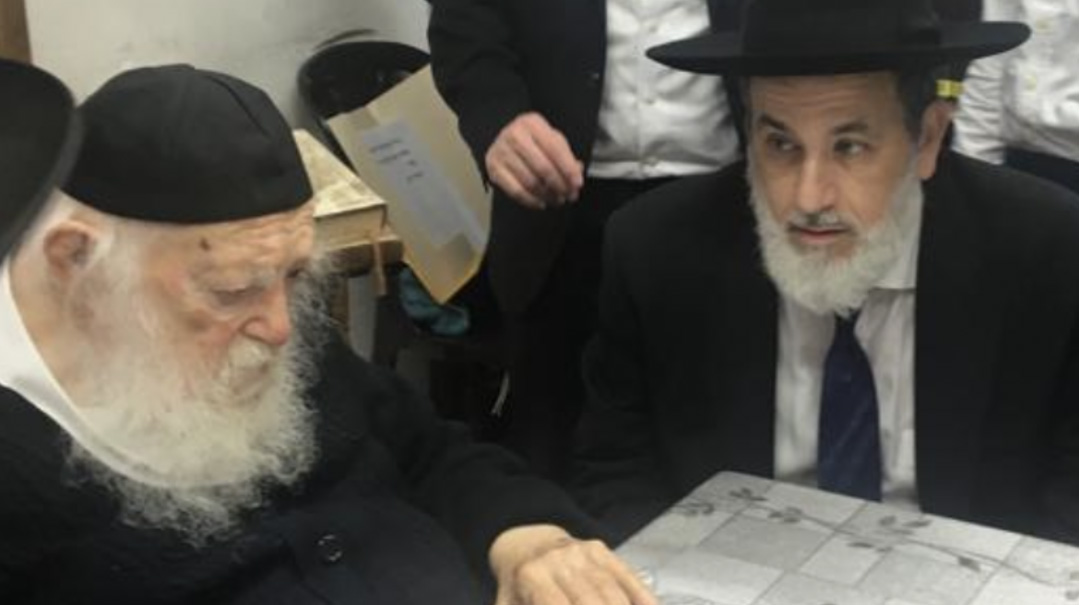
Rabbi Kuessous, a self-confessed workaholic, consecrates countless hours to Shaare Torah, Romimu, family, and helping and advising the many people in his life. But it never caught up to him physically until the Shabbos before his son’s wedding.
He was seated at the Friday night seudah with family and friends, when he started feeling strong abdominal pain. “I thought maybe it was the new suit I was wearing, so I loosened my belt,” he says. “Then suddenly the room began spinning. The next thing I knew I was in an ambulance headed for Maimonides Hospital.
“The ambulance workers didn’t really expect me to survive. I could hear them talking about me, saying that my vital signs were dropping lower and lower, and that I probably wouldn’t make it. I started talking to Hashem. I told Him, ‘I’m not ready to go, I have things to do….’”
He was having an acute heart attack, one that comes on suddenly when there’s a blockage in the left main artery that supplies 50 percent of the blood to the heart muscle. It can slay seemingly healthy people in a matter of minutes. At the hospital he was rushed into surgery and had a stent inserted. Because of the swift treatment, there was no long-term damage to his heart, and he was even able to leave the hospital Monday afternoon and walk his son David to the chuppah a few hours later. When the week of sheva brachos ended, he returned to the yeshivah, dedicated and vibrant as ever. “I have endless gratitude to Hashem,” he says, “that my life was spared.”
Rabbi Kuessous’ oldest brother Moshe had a different destiny. About 14 years ago, he was diagnosed with cancer and spent close to two years battling the disease. Rabbi Moshe Kuessous was Shaare Torah’s longtime principal, the father of a very large family, and a pillar of his community in Deal. In his last days, before his petirah, Yaakov Shwekey, a close neighbor and friend who considered Reb Moshe his mentor — sang for hours at his bedside.
Shwekey lived around the corner from Reb Moshe, and his wife Jenine had been a bat bayit in the Kuessous home when she was in high school, helping to care for the family’s twin little girls (children numbers 14 and 15) with Downs syndrome. Jenine, inspired by what she saw in the Kuessous home, would go on to found the Special Children’s Center. Yaakov Shwekey (who became friends with his brother Rabbi Armo Kuessous over thirty years ago when Shwekey was a teenager and staff member at Camp Romimu, working with special children) would become like a son-in-law to the family. When his musical career started to take off, Rabbi Kuessous would speak of the power of music and the potential to reach neshamos. “Go out, travel, reach audiences, and tell them how much Hashem loves them,” Rabbi Moshe Kuessous would tell him.
Shwekey wrote the song “Cry No More” in response to Rabbi Kuessous’ petirah, and named one of his sons Moshe in honor of him.
“The last day before Moshe passed away, he met with all of his close friends and family members,” Rabbi Armo Kuessous recalls. “He left each one with a message. With the knowledge that I would be taking over his position as menahel, he said to me, ‘Be a role model. Be a role model.’ He believed we teach most not by what we say, but by the way we comport ourselves, and that’s how he himself lived.”
Rabbi Moshe Kuessous will never be forgotten at Yeshiva Shaare Torah. His portrait hangs in his old office behind his brother’s desk (Reb Armo still looks at his picture and gains strength from him), and he’s included in an enormous gedolim banner that hangs in the lobby of the building.
Despite all that Rabbi Armo Kuessous has on his plate, family was, and remains, his top priority — it’s part of the mandate he accepted from his brother. The Kuessous family is known for their lively Shabbos tables filled with divrei Torah, zemirot, and guests (including some who don’t always find a warm welcome elsewhere). And while many vie for his attention, the children take top priority when their father’s listening ear and coaching skills are required.
But Rabbi Kuessous would be the first to tell you that’s only natural. After all, where more than family can he fulfill his brother’s words, to “be a role model”? It’s a continuation of the tradition both of them learned at home long ago.
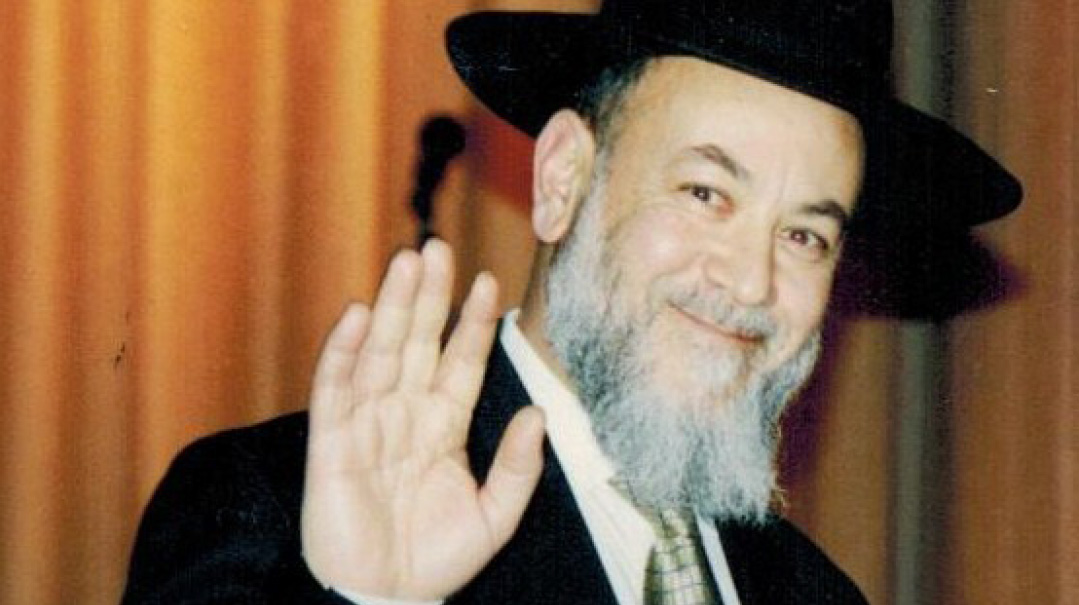
Rabbi Moshe Kuessous a”h, Shaare Torah’s longtime principal, father of a large family, and a founding pillar of the Torah community in Deal, left everyone with a parting message and a mandate
Momentum for the Day After
Rabbi Kuessous always has a hand in a multitude of projects, but is especially busy just now, because he’s organizing a major event for Ki Heim Chayeinu/Masmidei Shabbos, an initiative that grew out of the Siyum Hashas.
During the Siyum HaShas festivities in August of 2012, the Novominker Rebbe ztz”l emphasized that the program shouldn’t focus only on the day of the Siyum, as memorable as it might be. It should equally promote the day after the Siyum, when the cycle of learning recommences.
In response, a program called Masmidei HaSiyum was launched by Agudath Israel, in order to get children involved in continued learning. It offered points and prizes for learning, and was promoted by a group of young askanim — Shai Markowitz, Yechiel Eisenstadt, Shragie Goldschmidt, and Moshe Hass. But the reach wasn’t extensive. It seemed clear that in preparation for the upcoming Siyum HaShas of 2020, the program would need to network with yeshivos.
Businessman and askan Reb Shmuel Yosef Rieder reached out to Rabbi Kuessous to propose that he launch the initiative at Yeshiva Torah Temimah and expand from there. “I told him, I have no time, I’m running two schools, I just don’t have the hours,” Rabbi Kuessous relates.
Yet Mr. Rieder wouldn’t give up. “But you know principals, you know schools! You can be the shadchan. I’ll get you an assistant and a secretary.” Seeing Mr. Rieder’s obvious sincerity and dedication to carry out the project, Rabbi Kuessous allowed his arm to be twisted.
He was immediately rewarded with siyata d’Shmaya. One of his seventh grade rebbeim, Rabbi Reuven Hazan, had recently organized a yeshivah dinner. He had excellent organizational skills and was happy to come on board. A capable secretary was quickly found. By the time the next Siyum HaShas took place in January of 2020, 50,000 children from more than 50 schools in 14 countries had signed up.
Then Covid shut down the world, but Masmidei HaSiyum, undeterred, used its resources to continue its program. Kids could call in to a phone line and receive points and incentives for learning, and yeshivos and parents were grateful their children could be so engaged while stuck at home.
About a year later, Mr. Rieder had another idea. He believed that most kids didn’t have a deep enough understanding of Shabbos, and would benefit from a program to help them better grasp the beauty and depth of the gift of Shabbos. That summer, Masmidei HaShabbos was piloted at Camp Romimu under Rabbi Kuessous’ leadership. Colorful, lively booklets containing halachos and stories, created by Shmuli Rosenberg, were printed up for grades 4-8 and sent to many camps.
The program was so successful it was brought into schools for both boys and girls, soon reaching 150 schools and 25,000 students (and by extension their families) across the US. The booklets are published weekly, and mechanchim can use them for teaching or simply send them home with students.
“With siyata d’Shmaya,” says Rabbi Kuessous, “we hope to continue this program for four more years. Our goal is to unify the children of Klal Yisrael in their appreciation and understanding of the beauty of Shabbos, which will b’ezras Hashem spill over and enhance the shmiras Shabbos of thousands of families.”
(Originally featured in Mishpacha, Issue 954)
Oops! We could not locate your form.

